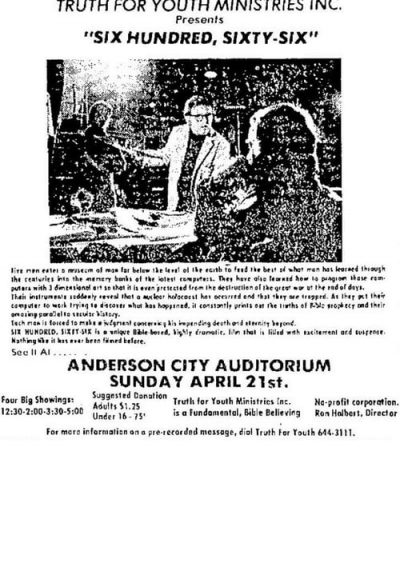 An evangelical film with a difference, which is to say that unlike most such films SIX-HUNDRED & SIXTY SIX, hailing from 1972, is almost good. An apocalyptic quasi-thriller that directly foreshadowed holy indies like APOCALYPSE and LEFT BEHIND, SIX-HUNDRED & SIXTY SIX was distributed via the traditional church-and-revival tent circuit through which most late twentieth century evangelical films were screened. Unlike its fellows SIX-HUNDRED & SITY SIX is distinguished by a reasonably well thought out futuristic mythology and a cast headlined by the veteran supporting player Joe Turkel (of PATHS OF GLORY, THE SHINING and BLADE RUNNER).
An evangelical film with a difference, which is to say that unlike most such films SIX-HUNDRED & SIXTY SIX, hailing from 1972, is almost good. An apocalyptic quasi-thriller that directly foreshadowed holy indies like APOCALYPSE and LEFT BEHIND, SIX-HUNDRED & SIXTY SIX was distributed via the traditional church-and-revival tent circuit through which most late twentieth century evangelical films were screened. Unlike its fellows SIX-HUNDRED & SITY SIX is distinguished by a reasonably well thought out futuristic mythology and a cast headlined by the veteran supporting player Joe Turkel (of PATHS OF GLORY, THE SHINING and BLADE RUNNER).
The setting is a future world torn apart by random violence and the burning of the Vatican. A “savior” who dubs himself Isiah the Prophet has apparently brought about universal peace, having forced humanity to get identification numbers tattooed on their wrists. Isiah has also ordered that the world’s “cultural memory” be stored in computers contained within an underground bunker. This place is a staid white walled environ ruled by a creepy female computer voice that always signs off with the refrain “I love you…”
Into this enclosure comes the steely Col. Ferguson, the new Operations officer. As the film opens he’s shown the ropes by one Mr. Tollman, a knowledgeable but deeply insane individual who resides in the bunker with three other men.
Inevitably a nuclear war breaks out above ground and destroys the world Ferguson and Tollman once knew. Worse, it seems they’re trapped inside the bunker, which is furthermore set to run out of air within a week due to a sealed-off ventilator. Conversation among the men quickly turns to Biblical prophecy, as it seems the events occurring in the world are following the future history laid in the Bible, starting with the rebirth of Israel.
Yet they’ve still got to contend with the insanity of Tollman, who believes that two of the men need to be killed in order to conserve air. He terrorizes his fellows with guns before being subdued, but manages to get free and, in the film’s best scene, is literally scared to death when he runs into the corpses of two men whose deaths he was instrumental in bringing about.
Taken purely as science fiction this film isn’t entirely without worth. The script by Marshall Riggan deserves credit for predicting, far in advance of most mainstream sci fi, the advent of microprocessors capable of holding entire libraries’ worth of data, while the direction by Tom Doades (who also has a small role as one of the bunker’s inhabitants) does a reasonably good job building suspense in a situation that directly anticipates that of John Carpenter’s THE THING. That, alas, doesn’t get Riggan and Doades off the hook for the dullness of the enterprise.
While the production values here are much higher than those of most holy indies, the film’s evangelical orientation is still quite evident throughout—meaning it never approaches the polish and professionalism of most “real” movies. A particular problem is with the extremely involved set-up, entailing a lengthy “exposition dump” that takes up most of the opening twenty minutes, while much of the last twenty consist of rambling conversations about the Biblical ramifications of the narrative.
The always compelling Joe Turkel grounds the proceedings quite nicely. It’s appropriate that in the film’s final scenes he’s the sole survivor, finishing things off with some well-acted histrionics.
Vital Statistics
SIX HUNDRED & SIXTY SIX
Ecaf Productions
Director: Tom Doades
Producer: Mal Couch
Screenplay: Marshall Riggan
Cinematography: Robert Jessup, Don Reddy
Editing: Jim Feguson
Cast: Joe Turkel, Byron Clark, John O’Connell, Ed DeLatte, Al Chavis, Tom Doades, Robert Crawford, Malachi Throne, Helena Humann
